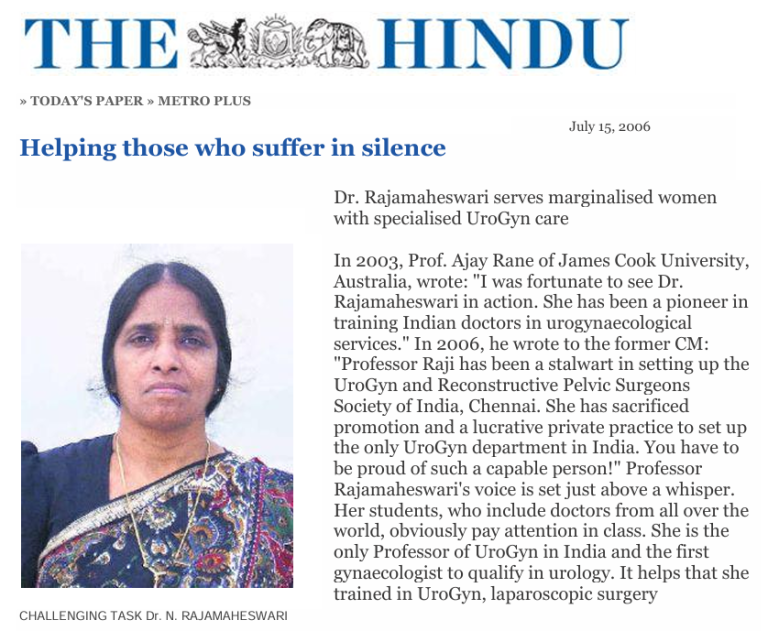Helping those who suffer in silence – THE HINDU

Dr. Rajamaheswari serves marginalised women with specialised UroGyn care. In 2003, Prof. Ajay Rane of James Cook University, Australia, wrote: “I was fortunate to see Dr. Rajamaheswari in action. She has been a pioneer in training Indian doctors in urogynaecological services.” In 2006, he wrote to the former CM: “Professor Raji has been a stalwart in setting up the UroGyn and Reconstructive Pelvic Surgeons Society of India, Chennai. She has sacrificed promotion and a lucrative private practice to set up the only UroGyn department in India. You have to be proud of such a capable person!” Professor Rajamaheswari’s voice is set just above a whisper. Her students, who include doctors from all over the world, obviously pay attention in class. She is the only Professor of UroGyn in India and the first gynaecologist to qualify in urology. It helps that she trained in UroGyn, laparoscopic surgery and ultrasound in the U.K., Germany, South Korea and Belgium. To know Dr. N. Rajamaheswari is to know her work. So she takes time off to explain its importance to women with UroGyn problems. Using the illustrated encyclopaedia that she has put together for teaching, brochures, educational CDs and the still and streaming slides she has captured during surgery, she gives a lecture that is as simple to follow as it is breathtaking in scope. “Did I scare you with all this information?” she asked. But you need it, to understand the relief and life change she brings to women who are isolated, ostracised and abandoned. Women with incontinence. With an MBBS and DGO from Tanjore Medical College, Dr. Rajamaheswari came to Chennai in 1982 for specialisation. Her MD in Obstetrics and Gynaecology from the MMC got her a government hospital job. Within a year of practice, she saw the connection between urology and gynaecology. “Anatomically and physiologically, urological and gynaecological organs are closely
related,” she explained. “So urinary symptoms can lead to gynaecological problems and vice versa.” She did an MCh in Urology in 1985 and began teaching at Stanley and MMC. As Assistant Professor at Gosha Hospital (now Kasturba Gandhi Hospital), in 1986, she organised a survey of 1,062 women (aged 20-70) who came to the OPD. Results showed high prevalence of Stress Urinary Incontinence (SUI). The southern urological conference recognised the need to train gynaecologists in urology, spread awareness about specialised services. As a spin-off, efforts began to be made to upgrade the UroGyn department at KGH, which now has state-of-the-art equipment for diagnosis, treatment and research.
Untold misery
“It’s an untold story,” Dr. Raji said. “Doctors concentrate on the baby while the mother faces the brunt.” A heavy baby, copper T migrating to the bladder, ageing, surgery, cysts, hormonal troubles, prolapsed uterus and a hole (fistula) in the bladder-vaginal passage can all result in incontinence – continuous or intermittent. A majority of the cases relate to childbirth injury. “Coughing, sneezing and even laughing could cause leakage and embarrassment. She loses her job and is shunned at home.” Dr. Raji has started a fistula ward for exclusive care. “In the best healthcare, obstetric fistula should not happen. In India, repeated pregnancies, teen pregnancies and botched deliveries are all reasons.” Since her patients are poor, her SUI correction methods are cost-effective. She has written chapters on them for books, held international workshops on UroGyn and reconstructive pelvic surgery issues, published papers, delivered lectures, conducted public forums for awareness. Founder-member or life member of several associations in this field, she started a clinic with a helpline in 1994 and established a research centre in 2001. She has also launched the URPSSI website and another for the hospital that has been the beneficiary of her path-breaking work. “Girls should start pelvic floor strengthening exercises during their high-school years,” she said and wants physiotherapists oriented in these exercises. Women should develop healthier washroom habits. “Exercise and medication will help in a lot of cases,” she assured. “All the complicated cases are referred to us. We have minimally invasive procedures. If you have involuntary, frequent or coloured urination, please come forward to discuss.” Why did she choose something so difficult? “India has just 4 UroGyn specialists. Countless women in Tamil Nadu are in need of UroGyn care and suffer in silence. I hope I have succeeded in motivating doctors to help them. The poor don’t know who is a good surgeon. They put all their faith in you. They carry on and are happy in spite of troubles.” There is no time for leisure. “Home is like a lodge, TV is for catching up with news. I need to work, that’s all I know.” But she can look back with satisfaction. She has succeeded in serving marginalised, stigmatised women from poor families, in a government institution with specialised UroGyn services on a par with those in developed countries.
– GEETA PADMANABHAN

